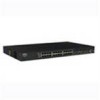Dell PowerConnect 5324 User's Guide - Page 26
Security Features, Locked Port Support - manual
 |
View all Dell PowerConnect 5324 manuals
Add to My Manuals
Save this manual to your list of manuals |
Page 26 highlights
www.dell.com | support.dell.com Syslog Syslog is a protocol that allows event notifications to be sent to a set of remote servers, where they can be stored, examined and acted upon. Multiple mechanisms are implemented to send notification of significant events in real time, and keep a record of these events for after-the-fact usage. For more information on Syslog, see "Managing Logs". SNTP The Simple Network Time Protocol (SNTP) assures accurate network device clock time synchronization up-to the millisecond. Time synchronization is performed by a network SNTP server. Time sources are established by Stratums. Stratums define the distance from the reference clock. The higher the stratum (where zero is the highest), the more accurate the clock. For more information, see "Configuring SNTP Settings". Traceroute Traceroute enables discovering IP routes that packets were forwarded along during the forwarding process. The CLI Traceroute utility can be executed from either the user-exec or privileged modes. Security Features SSL Secure Socket Layer (SSL) is an application-level protocol that enables secure transactions of data through privacy, authentication, and data integrity. It relies upon certificates and public and private keys. Port Based Authentication (802.1x) Port based authentication enables authenticating system users on a per-port basis via an external server. Only authenticated and approved system users can transmit and receive data. Ports are authenticated via the Remote Authentication Dial In User Service (RADIUS) server using the Extensible Authentication Protocol (EAP). For more information, see "Configuring Port Based Authentication". Locked Port Support Locked Port increases network security by limiting access on a specific port only to users with specific MAC addresses. These addresses are either manually defined or learned on that port. When a frame is seen on a locked port, and the frame source MAC address is not tied to that port, the protection mechanism is invoked. For more information, see "Configuring Port Security". 26 Introduction















